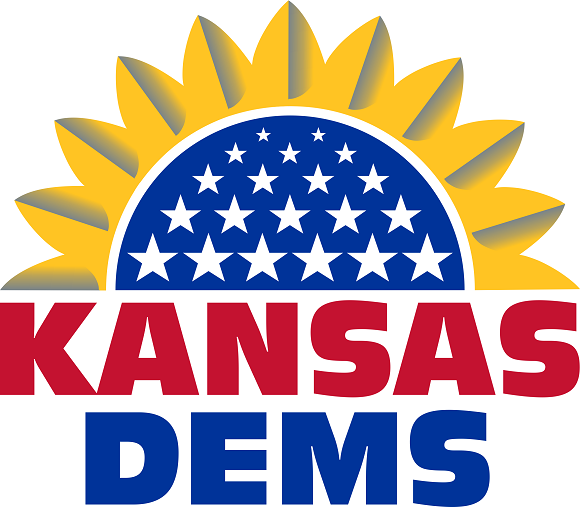Two former volunteer treasurers of the Kansas Democratic Party were fined for signing off on the party’s campaign finance reports that failed to accurately track hundreds of thousands of dollars in financial transactions.
The state ethics commission fined former treasurers Matt Watkins $5,000 and state Rep.-elect Tobias Schlingensiepen $1,000 for campaign finance violations on reports from 2011 to 2016. The fines can be forgiven in certain circumstances.
They also will be sent a letter of caution, which generally explains how to be civically engaged without violating the law.
Watkins and Schlingensiepen said they signed the campaign finance reports provided by party staffers believing they were accurate.
They said there was never any intent to provide inaccurate information. They said they did not personally benefit from the reporting errors.
Under state law, however, treasurers are responsible for what’s in the report, not the political party or any of its other officers.
And although Watkins and Schlingensiepen no longer have official roles with the party, they were the only ones who could be held responsible.
“I have literally dedicated my entire life to helping other people,” Schlingensiepen told the ethics commission.
“As a pastor and a police chaplain and now as a legislator-elect, this matter is personally painful to me,” he said.
“My current involvement with the Kansas Governmental Ethics Commission has been both embarrassing and educational,” he said.
“Embarrassing because I have never in my entire life experienced anything similar to this,” he said.
“Educational because I have learned a great deal from this experience,” he said.
“I assure each of you I will never again stand as a respondent before you.”
Watkins also expressed remorse for what occurred.
“I apologize for anything that might have happened,” he said. “I hope we can remedy it and move forward.”
The Democratic Party, which has not responded to earlier attempts seeking comment, alerted the ethics commission about the misreported transactions after an audit and cooperated with the investigation, officials said.
The Federal Election Commission had already fined the state Democratic Party twice since 2017 for campaign finance violations, including a $60,000 penalty in 2021 for about $3 million in transactions from six and seven years ago.
Pedro Irigonegaray, the attorney for Schlingensiepen, read an email from the executive director of the Democratic Party saying efforts have been undertaken to ensure accurate campaign finance reporting.
The state ethics commission recognized the difficulty the current case presented as well as the massive fines Watkins and Schlingensiepen faced because the law held the volunteer treasurers responsible for the reporting.
Mark Skoglund, executive director of the ethics commission, said the case was unprecedented.
He said the commission typically didn’t hold hearings to levy fines in cases of misreported transactions.
“This is not the normal way that we handle these,” he said.
“The only reason these are being treated differently than most misreporting is simply because of how extreme the number is,” he said.
“There was a significant amount that was misreported over this time period.”
Watkins faced 48 counts of alleged violations, while Schlingensiepen faced eight counts.
Watkins could have been fined as much as $240,000, while Schlingensiepen could have been hit with $40,000 in fines.
The commission agreed to remove the fines if Watkins and Schlingensiepen send a letter to 10 party or central committee treasurers explaining their ordeal and the legal exposure treasurers face for signing the campaign finance reports.
The commission also required Watkins to perform 24 hours of unspecified, nonpolitical public service to have the fine erased.
Schlingensiepen was required to perform eight hours of public service.
The complaints against Watkins and Schlingensiepen, which spanned 2011 to 2016, generally center on whether the party accounted for donations it received as well as the expenses it made during the time period in question.
The complaints said the party under-reported about $347,000 in donations during the timeframe while also under-reporting more than $434,000 in expenses.
There also were hundreds of thousands of dollars in contributions and expenses that lacked details such as the name and address either from where a contribution came or who received the money.
The party’s misreporting of financial transactions covered a larger period of time than what was in the ethics complaint, running from 2009 to 2016 and totaling about $1.5 million in transactions.
For instance, the party filed amendments to its campaign finance reports listing $521,831 in under-reported contributions and $206,510 in over-reported contributions.
The amendments also listed $546,859 in under-reported expenses plus another $252,513 in over-reported expenses.
The party agreed last month to pay out about $89,000 to five charities to make up for contributions from unknown sources, according to an amended report filed with the ethics commission.
The party paid about $19,000 to the ACLU Foundation of Kansas, $17,500 to the Kansas CASA Association, $17,500 to the Kansas Appleseed Center for Law and Justice, $17,500 to the League of Women Voters and $17,500 to Trust Women.
The payments were intended to cover reporting periods from 2009 to 2016.
Watkins and Schlingensiepen agreed to a stipulation facts that explained what procedures had been followed before they signed the reports.
The facts – as agreed to with the ethics commission – stipulate that they signed the finance report after the party finance director or operations director took in contributions or made expenses during the course of business.
The party’s compliance consultant would prepare a receipts-and-expenditures report based on records provided by the finance director or the operations director.
The compliance consultant would discuss any discrepancies with the finance director or the operations director and then submit a report to the party’s executive director for review.
The receipts-and-expenditures report was then sent to the treasurers for their review and signature.
Back in 2017, the Kansas Democratic Party agreed to pay a $19,000 fine to the Federal Elections Commission resulting from an audit of its records in 2011 and 2012, which overlaps the same time frame at issue in the state ethics case.
The FEC entered a conciliation agreement with the party resulting from the audit.
The FEC found the party had understated more than $122,000 in receipts and more than $162,600 in expenditures.
It found the party also failed to keep monthly payroll logs accounting for more than $320,000.
The agreement said the party contended the errors were inadvertent and it has worked to make improvements, including hiring new staff and allocating resources toward compliance.
And in 2021, the FEC fined the party $60,000 after it was found that it inaccurately reported debts, inaccurately reported its cash on hand, understated receipts and disbursements, and failed to itemize contributor information for contributions received from joint fundraisers.
The FEC required appropriate party staffers to attend a commission-sponsored training program for state and local political party committees.















